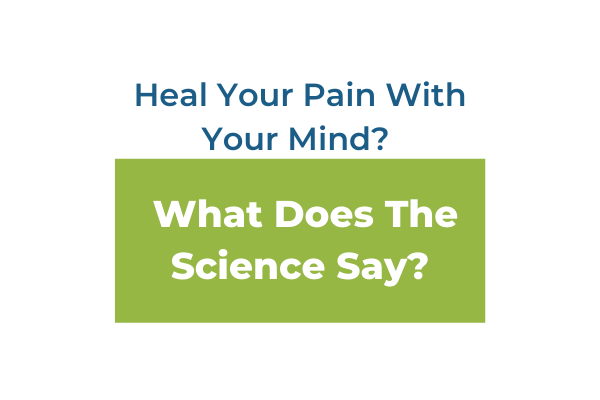
Can You Heal Your Pain With Your Mind-Body Connection? What Does the Science Say?
Today we’re going to review this research article:
Mind-Body Therapies for Opioid-Treated Pain: A Systematic Review and Meta-analysis JAMA Intern Med. 2019; doi: 10.1001/jamainternmed.2019.4917 November 4, 2019
Why is this paper so incredibly important right now?
Every day 130 people in the US die of opioid overdose[1]. There appears to be similar issues in other countries. Many of the people who lost their lives, started down a torturous road of dependence and addiction after being prescribed opioid drugs like oxycodone, morphine, and fentanyl for chronic pain. It’s pretty darn important that we find effective non-drug solutions for chronic pain.
This research article supports the perspective that mind-body therapies can reduce pain and reduce opioid use.
Let’s talk about the research and why it’s relevant for people with pain, whether they use opioid medications or not.
Meta-Analysis? What and Why is That?
Meta-analysis is a research tool to help clarify the meaning and understanding of previous studies. The idea is that all research studies can be biased and have errors. So in a meta-analysis, they use carefully-designed rules to pool data from multiple studies, to try to clarify what’s really happening. In this meta-analysis, the researchers carefully analyzed 60 previous research studies comprising 6404 participants, in research studies that evaluated the effectiveness of mind-body therapies in reducing pain and opioid use.
This research is also significant to people with pain who are not on opioids. People get prescribed opioids because they are having severe pain that won’t go away. If there is a therapy that works for people with pain so severe that they get opioid drugs, its likely to be useful in people whose pain is less severe, but still a source of significant suffering.
So, back to the research report….
It was a well-done meta-analysis. There are various methodological issues that need to be carefully addressed to yield a meaningful result in a meta-analysis. They do certain tests on the data to make sure that the analysis doesn’t introduce more error. I won’t go into the gritty details, but they did a thorough job. The studies they tested evaluated meditation, hypnosis, relaxation techniques, guided imagery, therapeutic suggestion, and cognitive behavioral therapy (CBT). With reasonable certainty, their data showed overall positive benefits to pain reduction, and reduction of opioid use for mind-body therapies.
What Did The Research Say?
The greatest pain reduction effect shown in the research was for meditation. Most of the meditation-based research was focused on chronic non-cancer pain. And most of the hypnosis, relaxation, and imagery studies were done in people having procedural, acute, or cancer pain.
The bottom line is this: if you’re an individual human being who is suffering with pain, the results tell us that meditation, CBT, hypnosis, therapeutic suggestion, and relaxation techniques are likely to be helpful. Just how helpful each of these will be for an individual varies per person. Most important is what it does tells us and that is, it is worth trying mind-body training.
That’s a positive result and should give you confidence around doing mind-body training if you have chronic pain. But this kind of research is merely touching the tip of the iceberg of how mind-body therapies can help. I’d like to share some perspective based on other research and a few decades of clinical experience
The Things I Hope You Never Know About Chronic Pain
This paper looked at the outcomes of pain and opioid use. From a clinical point of view, it’s relevant to think more broadly about the experience of pain and how to work with it.
There is a whole constellation of challenging issues associated with chronic pain from the point of view of someone who is suffering.
My patients often say things like:
- Doctor this pain is killing me!
- My other doctor gave me these medications and I’m concerned they will have side effects and hurt me.
- The pain started in my lower leg, and then my back, and now my shoulder is involved.
- I’m getting so darn depressed and anxious from the pain!
- The pain keeps me from sleeping and I’m exhausted all day
- The pain keeps me from doing the things that are important to me
- I’m smoking and drinking more alcohol than I should to deal with the pain.
- I’ve lost my sense of meaning and purpose because the pain is taking over my life
- Pain is having a bad effect on my relationship at home, at work, and with friends.
Most chronic pain experts who actually listen to their patients will agree that the items in the list above can conspire in positive feedback loops, and create a vicious cycle that feeds into itself and can really “bring someone down” into a cycle of disability, depression, and worse[2].
Pain reduction and decreased opioid use are relatively easy to measure and very important outcomes. But I’m sure you can see that there are broader issues that are important, in dealing with chronic pain. Mind-body medicine is also helpful for some of these.
Did You Know That You Have Inner Healing Superpowers?
In my experience, the power of mind-body treatment goes way beyond reducing pain scores and medication use. In the right context, mind-body practices can help address the other aspects of the overall experience of pain and suffering. They can help you move toward living a more happy and meaningful life, with or without pain. Indeed much of the research in mindfulness and other kinds of meditation are teasing out the benefits on other aspects of the pain experience.
Other benefits shown in research include[3][4][5]:
- Better mood[6]
- Increased sense of control and decreased sense of helplessness
- Activation of the relaxation response, with all of its physiologic benefit
- Improved sleep
- Reconnecting with purpose and meaning in life
- Cultivating forgiveness, gratitude, and genuine humility, which can cut through toxic emotions like guilt, shame, anger, and grief[7]
Healing Chronic Pain at Its Root With Mind-Body Training
Science is revealing that people with chronic pain have physiologic changes in the brain and spinal cord that amplify pain transmission[8][9]. That process of amplification appears to be integrated with all the systems of the body including hormones, intestinal biome and barrier function, nutrients, and cellular energy production[10]. These variables are an outcome of your genetics and life experience. Most people have the potential to make lifestyle choices (nutrition habits, mind-body skills, activity, and so on) that can shift the entire web of relationships that affect pain processing and experience.
Mind-body training has a crucial role in shifting this complex web of relationships.
The neurohormonal changes of deep relaxation and positive emotional states can influence all of the body systems[11][12][13][14]. And the enhanced learning and sense of empowerment make mind-body training a great foundation for other lifestyle changes that can make a huge impact on the disease process and quality of life.
I encourage you to learn more about mind-body medicine. Start looking into your local care organizations like hospitals and clinics. There may be private mental health practitioners in your area who offer group training in mind-body medicine. There are also many online opportunities to work with reputable providers of mind-body skills, and research supports the effectiveness of online programs for people with chronic pain[15][16].
I hope to talk about these issues in more detail in other posts. So check back at my site or look around there. If you want to get notified about new postings, please click here
Until then, I’m wishing you all the best.

[1] https://www.drugabuse.gov/drugs-abuse/opioids/opioid-overdose-crisis
[2] Platts-Mills, T.F., Dayaa, J.A., 2017. Musculoskeletal Injures in Older Adults Preventing the Transition to Chronic Pain and Disability. North Carolina Medical Journal 78, 318–321. https://doi.org/10.18043/ncm.78.5.318
[3] Hearn, J.H., Finlay, K.A., 2018. Internet-delivered mindfulness for people with depression and chronic pain following spinal cord injury: a randomized, controlled feasibility trial. Spinal Cord 56, 750–761. https://doi.org/10.1038/s41393-018-0090-2
[4] Ma, S.H., Teasdale, J.D., 2004. Mindfulness-Based Cognitive Therapy for Depression: Replication and Exploration of Differential Relapse Prevention Effects. Journal of Consulting and Clinical Psychology 72, 31–40. https://doi.org/10.1037/0022-006X.72.1.31
[5] Morley, S., Williams, A., 2015. New Developments in the Psychological Management of Chronic Pain. Can J Psychiatry 60, 168–175. https://doi.org/10.1177/070674371506000403
[6] Sephton, S.E., Salmon, P., Weissbecker, I., Ulmer, C., Floyd, A., Hoover, K., Studts, J.L., 2007. Mindfulness meditation alleviates depressive symptoms in women with fibromyalgia: Results of a randomized clinical trial. Arthritis Rheum 57, 77–85. https://doi.org/10.1002/art.22478
[7] Oman, D., Shapiro, S.L., Thoresen, C.E., Plante, T.G., Flinders, T., 2008. Meditation Lowers Stress and Supports Forgiveness Among College Students: A Randomized Controlled Trial. Journal of American College Health 56, 569–578. https://doi.org/10.3200/JACH.56.5.569-578
[8] Cagnie, B., Coppieters, I., Denecker, S., Six, J., Danneels, L., Meeus, M., 2014. Central sensitization in fibromyalgia? A systematic review on structural and functional brain MRI. Seminars in Arthritis and Rheumatism 44, 68–75. https://doi.org/10.1016/j.semarthrit.2014.01.001
[9] Dodick, D., Silberstein, S., 2006. Central Sensitization Theory of Migraine: Clinical Implications. Headache 46, S182–S191. https://doi.org/10.1111/j.1526-4610.2006.00602.x
[10] Zhang, J.-M., An, J., 2007. Cytokines, Inflammation, and Pain: International Anesthesiology Clinics 45, 27–37. https://doi.org/10.1097/AIA.0b013e318034194e
[11] Black, D.S., Slavich, G.M., 2016. Mindfulness meditation and the immune system: a systematic review of randomized controlled trials: Mindfulness meditation and the immune system. Ann. N.Y. Acad. Sci. 1373, 13–24. https://doi.org/10.1111/nyas.12998
[12] Rosenkranz, M.A., Davidson, R.J., MacCoon, D.G., Sheridan, J.F., Kalin, N.H., Lutz, A., 2013. A comparison of mindfulness-based stress reduction and an active control in modulation of neurogenic inflammation. Brain, Behavior, and Immunity 27, 174–184. https://doi.org/10.1016/j.bbi.2012.10.013
[13] Morgan, N., Irwin, M.R., Chung, M., Wang, C., 2014. The Effects of Mind-Body Therapies on the Immune System: Meta-Analysis. PLoS ONE 9, e100903. https://doi.org/10.1371/journal.pone.0100903
[14] Bower, J.E., Irwin, M.R., 2016. Mind–body therapies and control of inflammatory biology: A descriptive review. Brain, Behavior, and Immunity 51, 1–11. https://doi.org/10.1016/j.bbi.2015.06.012
[15] Rini, C., Porter, L.S., Somers, T.J., McKee, D.C., DeVellis, R.F., Smith, M., Winkel, G., Ahern, D.K., Goldman, R., Stiller, J.L., Mariani, C., Patterson, C., Jordan, J.M., Caldwell, D.S., Keefe, F.J., 2015. Automated Internet-based pain coping skills training to manage osteoarthritis pain: a randomized controlled trial. PAIN 156, 837–848. https://doi.org/10.1097/j.pain.0000000000000121
[16] Friesen, L.N., Hadjistavropoulos, H.D., Schneider, L.H., Alberts, N.M., Titov, N., Dear, B.F., 2017. Examination of an internet-delivered cognitive behavioural pain management course for adults with fibromyalgia: a randomized controlled trial. PAIN 158, 593–604. https://doi.org/10.1097/j.pain.000000000000080

